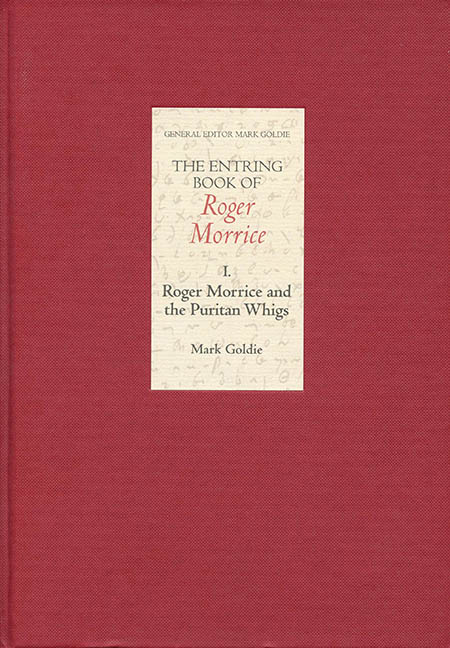Book contents
- Frontmatter
- Contents
- List of Illustrations
- Foreword
- Preface
- Notes on the Editors
- Acknowledgements
- Reader's Guide
- Abbreviations
- Genealogical Tables
- Maps
- Maps
- 1 Politics and Religion in the Era of the Entring Book
- 2 Roger Morrice: Fragments of a Life
- 3 The Text of the Entring Book
- 4 Puritan Whigs
- 5 Country Whigs
- 6 Middle-Way Religion
- 7 The History of the Puritans
- 8 Epilogue: The Entring Book and the Historians
- Appendices
- Bibliography
- Index
8 - Epilogue: The Entring Book and the Historians
Published online by Cambridge University Press: 07 October 2017
- Frontmatter
- Contents
- List of Illustrations
- Foreword
- Preface
- Notes on the Editors
- Acknowledgements
- Reader's Guide
- Abbreviations
- Genealogical Tables
- Maps
- Maps
- 1 Politics and Religion in the Era of the Entring Book
- 2 Roger Morrice: Fragments of a Life
- 3 The Text of the Entring Book
- 4 Puritan Whigs
- 5 Country Whigs
- 6 Middle-Way Religion
- 7 The History of the Puritans
- 8 Epilogue: The Entring Book and the Historians
- Appendices
- Bibliography
- Index
Summary
IN 1946 the librarian of Dr Williams's Library, Roger Thomas, introduced the Entring Book to a recently demobbed American naval officer, Douglas Lacey. Lacey had been awarded a Rockefeller Foundation fellowship for a year's research in England towards his Columbia University doctoral thesis. The Entring Book became the cornerstone of Lacey's thesis and of the monograph that eventually followed, Dissent and Parliamentary Politics in England, 1661–1689. Almost immediately, in 1947, Lacey decided that the Entring Book ought to be published. He was authorised to prepare an edition by the Trustees of the Library and in 1950 announced his project in the Bulletin of the Institute of Historical Research. He overcame, it seemed, one major impediment to such a project, for his father, Raymond Lacey, a retired professor of classics, made progress in deciphering Morrice's shorthand. But other impediments intervened. As he once ruefully remarked, ‘it took E. S. de Beer a quarter century to do the Evelyn Diary’. It must be said that the edition of Morrice, as he conceived it, would inevitably have taken decades, for the apparatus of footnotes that he envisaged was hugely ambitious. His teaching and administrative duties at the United States Naval Academy, Annapolis, where he spent his whole career, delayed him, and the completion of his thesis and monograph rightly took priority over the edition. The monograph finally appeared in 1969. Only then could he return to the Entring Book. With the encouragement of Basil Duke Henning, he negotiated, in 1964–7, with the University of London's Athlone Press, and then, in 1968–70, with Oxford University Press, and in 1972 the latter agreed a contract for an edition in four volumes. In the following year Lacey died at the age of sixty. Dissent and Parliamentary Politics is still unsurpassed in its use of Morrice's chronicle to unravel a central theme in Restoration history.
The next scholar who hoped to see Morrice in print was Lois G. Schwoerer of Washington University, St Louis, who met Lacey at the Folger Library in Washington in 1971.
- Type
- Chapter
- Information
- The Entring Book of Roger MorriceRoger Morrice and the Puritan Whigs, pp. 308 - 318Publisher: Boydell & BrewerPrint publication year: 2007



